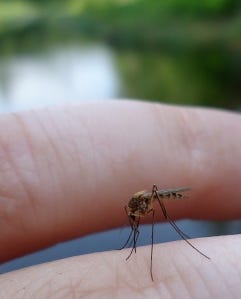Casting Doubts
Ha! whaur ye gaun, ye crowlin ferlie? Your impudence protects you sairly; I canna say but ye strunt rarely, Owre gauze and lace; Tho', faith! I fear ye dine but sparely On sic a place.
Ye ugly, creepin, blastit wonner, Detested, shunn'd by saunt an' sinner, How daur ye set your fit upon her- Sae fine a lady? Gae somewhere else and seek your dinner On some poor body.
I've been reading Laurie Garrett's A Coming Plague at bedtime. Last night was the chapter on cities, and their interconnection with epidemics from the dawn of history. I've read enough history, and historical fiction (good and bad!) to know intuitively something she discusses as a possible reason that medieval Europe was so blighted and blasted with disease. The people of the time actively feared bathing, and didn't do it. Also, they were crawling, literally, with fleas, lice, and all manner of bloodsucking beasties.

At least the insects are getting a living out of their biting.
I've written here on the blog before about the backhanded wit of John Donne's Flea, and above I've put a few lines of Robbie Burns' To a Louse. The presence is the lowest of humor, but a grave matter then, before the germ theory was understood. Reading about the death rates gives a shocking sense of how safe we are, how clean…
But then I find disturbing errors in the book I am reading. Cholera, a disease caused by fecal contamination of water supplies, struck New York City in 1832, claiming 500,000 lives, Garrett claims. However, by other accounts, the population of New York City was about 250,000 in that era. The Population History of New York City by Ira Rosenwaike states that the death toll rose above 40 in every 1000 people, a shocking number in itself, but a total of 3215 deaths that year. Why would Garrett so grossly exaggerate the death toll? It can't have been that difficult to determine the numbers, I found in a few moments searching a large number of sources, the epidemic having been a terrible experience that led to widespread urban reform, and thus much written-about.
This is why, whether I'm reading for pleasure, or research, I try never to rely on only one source. I'm not sure I'll finish A Coming Plague, which is a shame, it is a fascinating topic, and most of her work seems to be sound. But little cracks lead to bigger ones, and soon the pot not only won't hold water, but cuts the hands holding it.
Now, I'm off to take a long hot shower. Reading about all that filth and insect infestation has me wanting one badly!



